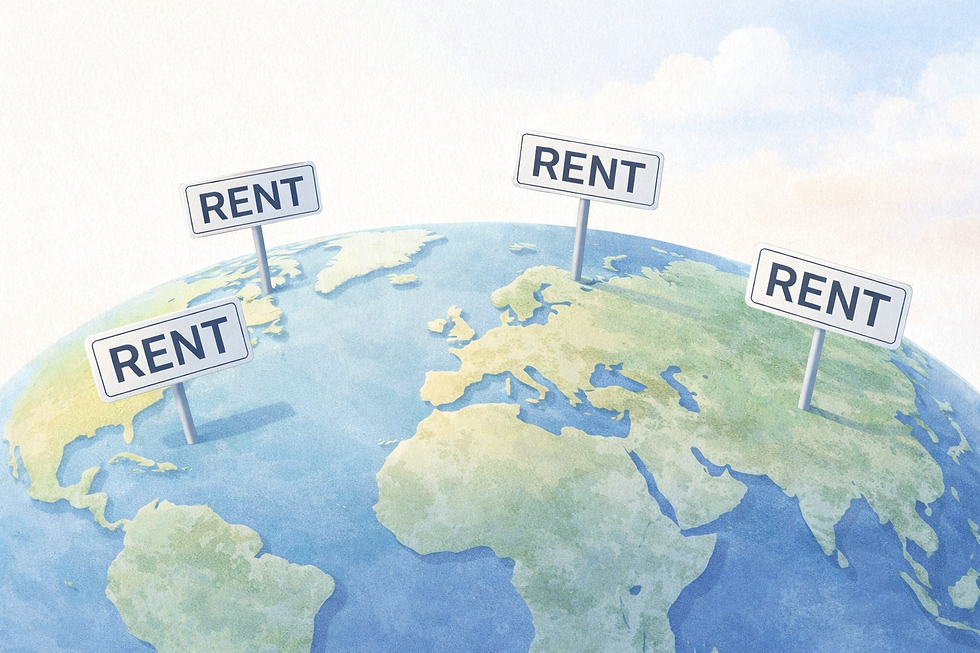"Is real estate a good hedge against inflation?"
- Rich Arzaga

- Feb 27, 2022
- 5 min read

"Is real estate a good hedge against inflation?"
I get this question on occasion.
Mostly from investors new to real estate investing. As new investors collect information on the merits of real estate, an inflation hedge is one of the benefits they read about. I have never heard this question from clients who currently own real estate of different types. Likely because they know how it works and, to some extent, what to expect.
The four potential benefits of a good investment property are
Cash flow
Leverage (Amortization)
Tax benefits
Appreciation
Note that the word "good" is being used as a condition to the benefits. Not all real estate is a good investment.
Sure, you can work the discussion so that perhaps cash flow and appreciation can be ways to offset inflation. But as a primary reason to invest, inflation is not among the top four benefits.
It makes the article that follows a little less important to worry about. The impact of rising interest rates will impact cash flow, leverage, and appreciation. But for investors who agree that real estate smooths out these wrinkles by holding it for the long term, than understanding current cash flow helps mitigate this concern.
As you read this article, what you might forget for a moment is that less than two years ago, individual investors imagined that commercial real estate would collapse under the weight of Covid. Fast forward, many of the property types have remained strong during the entire period.
Looking at the "good" real estate assets in general, only a couple of property types (ex. hospitality, senior living) struggled but are finding their way back. It's a reminder of why institutional investment firms can do better in real estate than individual investors left to their own resources.
Rich Arzaga, CFP®, CCIM
The Wall Street Journal PROPERTY REPORT
Commercial Real Estate Is Seen as an Inflation Hedge, but That Isn’t Always the Case
With inflation running its hottest in four decades, some investors are starting to question the strength of real estate’s defenses against higher prices
By Peter Grant, Feb. 22, 2022, 8:00 am ET
Investors purchased a record amount of commercial property and bet big on real-estate stocks last year, viewing the sector as a hedge against inflation.
Now, with inflation running its hottest in four decades, some investors are starting to question the strength of real estate’s defenses against higher prices.
Commercial properties have long been viewed as inflation protection because owners of many property types can raise rents to stay ahead of price increases. Rental apartments and self-storage units are particularly well-suited to a rising-price environment, since their rents typically reset annually.
Investors also believe commercial property can benefit from some of the same forces now driving inflation. Ballooning labor costs and supply-chain shortages are limiting new development, which bodes well for owners of properties already operating.
But some investors are beginning to shift money out of real estate as they focus less on its value as an inflation hedge and more on the potential damage to the property sector if persistent price increases drive up long-term interest rates. Rising rates lead to higher financing costs, making it more expensive for owners to refinance a building and eroding the value of property.
Shares of real-estate companies are underperforming the broader stock market this year, a sign that some investors may be souring on their value as an inflation hedge, said Vikram Malhotra, an analyst with Mizuho Americas.
“We are starting to get the question from investors: Is this [hedging strategy] overdone or does this have legs?” he said.
Analysts say commercial real estate’s appeal as an inflation hedge was a factor in driving a record $809 billion in sales volume in the U.S. last year. Real-estate stocks gained more than 43% in 2021, outperforming the broader S&P 500 by about 15 percentage points
Office buildings didn’t fare as well as apartments and industrial space. While their poorer performance reflects how the growing popularity of remote work threatens office use, office properties also struggled because their longer leases could be problematic if inflation persists, analysts said.
Stock performance of lodging companies also trailed other major property types last year, even as the business shows signs of picking up. Hotels can stay ahead of inflation by raising room prices daily. But these properties are vulnerable to higher prices in other ways, such as the rising cost of labor and, for full-service hotels, paying more for food to serve in their restaurants.
Commercial property’s appeal as an inflation hedge could fade further if investors focus more on interest rates, which look poised to keep moving higher as the Federal Reserve winds down its bond-buying program and begins a new cycle of short-term rate increases.
“If rates rise just because of inflation, real estate is still viewed as a good bet,” said Cedrik Lachance, head of research for real estate analytics firm Green Street.
But inflation is just one force driving interest rates. Banks and bond investors may also push up rates if they think the risk of not being repaid is rising because of a poor economic outlook.
If rates go up because of forces other than inflation, “that is very uncomfortable for real-estate values,” Mr. Lachance said.
Real estate’s performance during times of inflation has been mixed. Mizuho looked at how real-estate investment trusts fared since the mid-1990s, focusing on periods similar to the current time when inflation was higher than the average of the previous five years and rising.
“In that environment, historically REITs do outperform,” said Mr. Malhotra.
But, partly due to the pandemic, a number of unique forces are at work now, such as the supply-chain shortages and high rate of people quitting their jobs. These factors raise the prospect that inflation might not be tamed as quickly as it was in the past 30 years and that long-term rates may rise.
Landlords may not be able to keep raising rents for years because there is eventually new supply or tenants simply can’t afford to pay more.
“If inflation is persistently high, REITs may not act as an ongoing inflation hedge,” Mr. Malhotra said.
As interest rates rise, real-estate yields may offer less of a premium over fixed-income investments, leading some investors to opt for the relative safety of bonds. Analysts say that the 10-year Treasury rate would need to exceed 3% before that shift would happen, up more than 1 percentage point from today.
“Until then the yields of properties are relatively attractive,” said Darrell Wheeler, a senior analyst of commercial mortgage-backed securities at Moody’s Analytics.
Many investors continue to buy real estate, betting that long-term rates won’t get that high and that they will be able to keep raising rents to stay ahead of inflation. Some rental apartment investors are buying property on the assumption that they will be able to keep raising rents over 5% annually.
Others aren’t so sure. “Some of the pros who have been around for a while are standing back from the market,” said Mr. Wheeler.




Comments